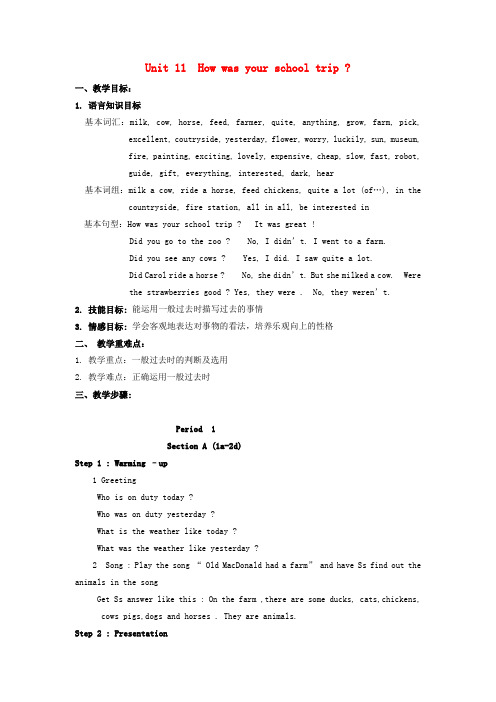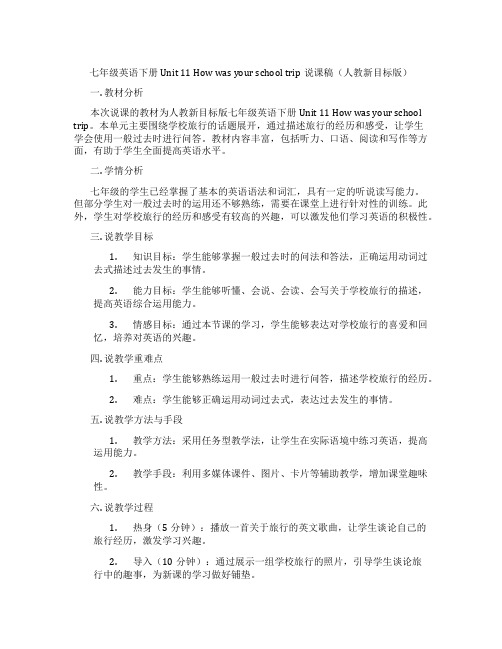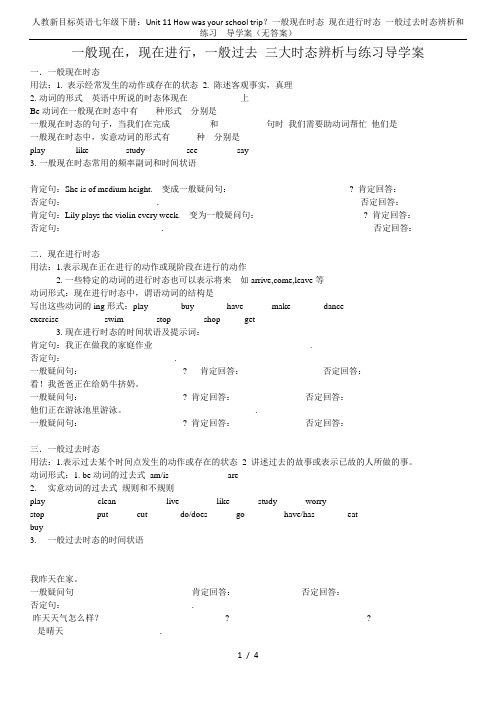人教版新目标七年级下学期Unit-11-How-was-your-school-trip.知识点讲解
人教新目标go for it七年级下册英语Unit11Howwasyourschooltrip教案36

Unit 11 How was your school trip?教材解读本单元以“学校旅行”为主题,以同学之间谈论各自的游览经历为背景,展开多种形式的语言训练活动,在各个活动中学生逐步学会运用一般过去式叙述和询问过去的活动经历,并灵活运用be动词和实义动词以及不规则动词的变化。
总之,通过本单元的学习要使学生对过去式有一个深入的了解。
单元目标一、知识与技能.1. Can talk about the past events.2. 能正确使用be动词和实义动词的一般过去时描述和询问过去的状态。
3. 能归纳规则动词过去式的变化规律并写出部分规则动词和不规则动词的过去式。
4. Master some important words and useful expressions.二、过程与方法采用任务型语言教学,实施情景教学法、交际法、情感激励法等教学方法。
三、情感态度与价值观培养学生的合作精神。
教法导航采用直观教学法,遵循以学生为主体,充分调动学生的积极性的原则。
学法导航培养学生的交际能力和认知能力。
课时支配第1课时:Section A1a-2c第2课时:Section A2d-3b第3课时:Section B 1a-2a第4课时:Section B 2b-Self Check 课时教案第1课时 1a-2c教学目标一、知识与技能1. 学会用动词的过去式描述过去发生的事。
2. Improve the listening and speaking skill.3. 掌握一些规则变化动词的过去式和一些不规则变化的动词。
二、过程与方法采用目标和任务教学法,调动学生的积极性,引导他们积极参与课堂。
三、情感态度与价值观提高认知能力。
教学重点1. 学会用动词的过去式描述过去发生的事。
2. Improve the listening and speaking skill.3. 掌握一些规则变化动词的过去式和一些不规则变化的动词教学难点学会用动词的过去式描述过去发生的事。
人教新目标版七年级英语下册Unit11Howwasyourschooltrip优质教案

Unit 11 How was your school trip ?一、教学目标:1. 语言知识目标基本词汇:milk, cow, horse, feed, farmer, quite, anything, grow, farm, pick, excellent, coutryside, yesterday, flower, worry, luckily, sun, museum,fire, painting, exciting, lovely, expensive, cheap, slow, fast, robot,guide, gift, everything, interested, dark, hear基本词组:milk a cow, ride a horse, feed chickens, quite a lot (of…), in the countryside, fire station, all in all, be interested in基本句型:How was your school trip ? It was great !Did you go to the zoo ? No, I didn’t. I went to a farm.Did you see any cows ? Yes, I did. I saw quite a lot.Did Carol ride a horse ? No, she didn’t.But she milked a cow. Were the strawberries good ? Yes, they were . No, they weren’t.2. 技能目标: 能运用一般过去时描写过去的事情3. 情感目标:学会客观地表达对事物的看法,培养乐观向上的性格二、教学重难点:1. 教学重点:一般过去时的判断及选用2. 教学难点:正确运用一般过去时三、教学步骤:Period 1Section A (1a-2d)Step 1 : Warming –up1 GreetingWho is on duty today ?Who was on duty yesterday ?What is the weather like today ?What was the weather like yesterday ?2 Song : Play the song “ Old MacDonald had a farm” and have Ss find out the animals in the songGet Ss answer like this : On the farm ,there are some ducks, cats,chickens, cows pigs,dogs and horses . They are animals.Step 2 : Presentation1 Show a picture and tell Ss: This is also a farm. Last week Carol and his classmates had a school trip. They went to the farm. What did they do on the farm? How was their school trip?2 Show some pictures again and try to get the past tense verbs expressions according to the pictures.(1) Show the picture and the question(2) Ask one student to answer the question.(3) All students read it toghter.Q:Did he ride a horse?A:Yes, he did. He rode a horse.Q:Did he milk a cow?A:Yes, he did. He milked a cow.Q:Did he ride a horse?A :No, he didn’t .Did he feed chickens?Yes, he did. He fed chickens.Did you go to the zoo?No, I didn’t. I went to a farm.Did you see any cows ?Yes, I did. I saw quite a lot.Did they pick any strawberries on the farm ?Yes, they did .How were the strawberries?They were delicious.Were the strawberries good?Yes, they were.No, they weren’t.How was your school trip ?It was great.Were the strawberries good ?Yes ,they were.No, they weren’t.Step 3 ExercisesStep 4 : Practice (Listening and speaking)1a Match the phrses with the pictures.1b Listen and circle the three things Carol did on her school trip in 1a.1c Ask and an swer questions about Carol’s school trip.2a Listen and check the questions you hear.2b Listen again.Circle T for true or F for false2c Ask and answer questions about Carol’s visit to the farm.Step 5 :Tasks:1 Look at the pictures and practice the dialogueA:How was your school trip?B: It was …(boring/interesting/good/great…)A:What did you do on the school trip ?B:I went for a walk with my classmates.2 2d Role-play the conversation3.Groupwork: Make a survey. Ask your partners what they didlast week. Then give a reporter.Step 6 : Grammar Focus ( Get Ss read aloud )How was your school trip ? It was great !Did you go to the zoo ? No, I didn’t. I went to a farm.Did you see any cows ? Yes, I did. I saw quite a lot.Did Carol ride a horse ? No, she didn’t. But she milked a cow.Were the strawberries good ? Yes, they were . No, they weren’t.Step 6 Summary and Language pointsStep 7 Exercises :Period 2Section A (Grammar Focus-3b)Step 1:1 GreetingHow are you today ?How were you yesteday ?How was your last school trip ?2 Free talk :T : Do you want to know something about your classmates’ school trip ?Now Ask your partner :What did you do on your school trip ? Then fillin the following chart.Step 2 :Pre-task :1.Look at the pictures and fill in the blanks.2.Write the past forms of the following verbs.3. Check the past forms .Then ask Ss to summerize the rules of past forms ofthe regular verbs.Then explain the rules of past forms of the regular verbsStep 3 While-task 3a1 Ask Ss to read the letters in 3a .2 Ask Ss to complete Jim’s letter on the left and Bill’s reply on the right.3 Check the answers .Ask Ss to pay attention to the past tenst verbs.4 Explain the language points5 Read the letters together.Step 4: Post-task1. Challenge:Ask Ss to fill in the blanks according to the pictures.2 Check the answers. Ask Ss to read the answers one by one.3 Have a student read the letter out aloud.4 Ask Ss to read the letter several times. Try to recite it.5 Groupwork: Make up a story. Each student adds a sentence.If he or she can’tadd a sentenec .He or she must sing an English song.You can begin like this:Last week I visited my aunt’s house.____________________________________________________________________________________________________________________________Step 5 Language points and ExercisesPeriod 3Section B (1a-2c)Step 1:1 GreetingWhat did you do yesterday ?How were you yesterday ?2 Review: GamesUse your imagation and make up a story. Each student adds a sentence.If he or she can’t add a sentence,h e or she must sing an English song.Step 2 :Preparation 1a1 Match the activities with the pictures.2 Check the answersStep 2 :Listening 1b 1c1 Listen and answer the questions.1 How was Jane’s trip ?2 How was Tony’s trip ?2 Check the answers.3 Listen again. What did Jane and Tony do on their last school trip ? CheckTony or Jane.Step 3:Speaking 1d1 What was your last school trip like ?Discuss it with your partner with the following words.2 Teach Ss to read the following words :interesting difficult lovely slowexciting boring cool hotlucky large expensive terrible decilious great cheap fast3 Discuss like following conversation.A: I went to a farm on my last school trip.There are many animals on the farm.They are very lovely.B: That sounds great.A: How was your school trip ?B: It was __________A: How was the food there ?B: It was _____________A: How was the weather ?B: It was ___________Step 4: Prepatation2a Do the following words describe good things or bad things ? Put a √for good and an ×for bad . Leave a blank if they can mean both.Step 5 : Reading 2b,2c1 Read Helen’s and Jim’s diary entries and answer the questions in 2b2 Read the diaries again and complete the chart in 2cHow do Helen and Jim describe these things ?3 Check the answers .Ask Ss to pay attention to the past tenst verbs.4 Explain the language points5 Read the passages aloudStep 6 : Language points and exercises.Period 4Section B (3a-Self check )Step 1:1 GreetingHow are you feeling today?What did you do last night?How was your homework yesterday?2 Review : GamesUse your imagnation and make up a story. Each student adds a sentence.If he or she c an’t add a sentence,he or she must sing an English song. Step 2 : Preparation1.3a Look at the pictures of Bob’s school plete his diary entry.2. 3b Linda is Bob’s classmate. Complete her diary entry.Step 2 : Writing3c Now write a diary entry for your own school trip.Explain if you liked it or didn’t like it and why.Step 3 : Self-check1 Write more verbs and their past forms in each group.2 Complete the conversations with the correct forms of the verbs in the box.3 Check the answers4 Grammar: The Simple Past Tense。
人教新目标版英语七下Unit 11《How was your school trip》(Sectio

人教新目标版英语七下Unit 11《How was your school trip》(Section A 1a—1c)教学设计一. 教材分析人教新目标版英语七下Unit 11《How was your school trip》主要让学生通过学习和交流,掌握过去进行时态的用法,以及如何描述过去发生的事情。
本节课的主要内容是关于学生在学校旅行中的见闻和感受,通过听、说、读、写的方式,提高学生的语言运用能力。
二. 学情分析学生在学习本节课之前,已经掌握了基本的英语语法知识,具备一定的听、说、读、写能力。
但对于过去进行时态的运用,可能还存在一定的困难。
因此,在教学过程中,需要注重引导学生理解和运用过去进行时态。
三. 教学目标1.学生能够掌握过去进行时态的构成和用法。
2.学生能够通过听、说、读、写的方式,描述自己在学校旅行中的见闻和感受。
3.学生能够在真实情境中,运用过去进行时态进行交流。
四. 教学重难点1.过去进行时态的构成和用法。
2.如何引导学生运用过去进行时态描述过去发生的事情。
五. 教学方法1.情境教学法:通过设置真实的情境,让学生在实践中学习和运用过去进行时态。
2.任务型教学法:通过完成各种任务,引导学生积极参与课堂活动,提高语言运用能力。
3.互动式教学法:教师与学生、学生与学生之间的互动,激发学生的学习兴趣,提高课堂氛围。
六. 教学准备1.教学PPT:包含本节课的主要内容、图片、视频等。
2.教材:人教新目标版英语七下Unit 11。
3.录音机:用于播放听力材料。
4.教学卡片:用于操练和巩固所学内容。
七. 教学过程1.导入(5分钟)利用图片或视频展示学校旅行的场景,引导学生回忆学校旅行中的趣事,激发学生的学习兴趣。
2.呈现(10分钟)教师通过PPT呈现本节课的主要内容,包括单词、短语和句子。
同时,讲解过去进行时态的构成和用法,让学生初步感知和理解。
3.操练(15分钟)学生分组进行角色扮演,模拟学校旅行中的场景,用过去进行时态进行交流。
七年级英语下册Unit11Howwasyourschooltrip说课稿(人教新目标版)

七年级英语下册 Unit 11 How was your school trip说课稿(人教新目标版)一. 教材分析本次说课的教材为人教新目标版七年级英语下册Unit 11 How was your school trip。
本单元主要围绕学校旅行的话题展开,通过描述旅行的经历和感受,让学生学会使用一般过去时进行问答。
教材内容丰富,包括听力、口语、阅读和写作等方面,有助于学生全面提高英语水平。
二. 学情分析七年级的学生已经掌握了基本的英语语法和词汇,具有一定的听说读写能力。
但部分学生对一般过去时的运用还不够熟练,需要在课堂上进行针对性的训练。
此外,学生对学校旅行的经历和感受有较高的兴趣,可以激发他们学习英语的积极性。
三. 说教学目标1.知识目标:学生能够掌握一般过去时的问法和答法,正确运用动词过去式描述过去发生的事情。
2.能力目标:学生能够听懂、会说、会读、会写关于学校旅行的描述,提高英语综合运用能力。
3.情感目标:通过本节课的学习,学生能够表达对学校旅行的喜爱和回忆,培养对英语的兴趣。
四. 说教学重难点1.重点:学生能够熟练运用一般过去时进行问答,描述学校旅行的经历。
2.难点:学生能够正确运用动词过去式,表达过去发生的事情。
五. 说教学方法与手段1.教学方法:采用任务型教学法,让学生在实际语境中练习英语,提高运用能力。
2.教学手段:利用多媒体课件、图片、卡片等辅助教学,增加课堂趣味性。
六. 说教学过程1.热身(5分钟):播放一首关于旅行的英文歌曲,让学生谈论自己的旅行经历,激发学习兴趣。
2.导入(10分钟):通过展示一组学校旅行的照片,引导学生谈论旅行中的趣事,为新课的学习做好铺垫。
3.新课呈现(15分钟):讲解一般过去时的问法和答法,示例说明如何用动词过去式描述过去发生的事情。
让学生跟读、模仿,确保正确掌握。
4.实践环节(15分钟):学生分角色扮演,模拟学校旅行的场景,运用一般过去时进行问答。
人教新目标版英语七下Unit 11《How was your school trip》(Sectio

人教新目标版英语七下Unit 11《How was your school trip》(Section B 2a)教学设计一. 教材分析人教新目标版英语七下Unit 11《How was your school trip》主要让学生通过学习关于学校旅行的相关话题,掌握一般过去时的疑问句和回答,以及如何描述过去的事情。
Section B 2a是一篇关于两个学生讨论他们学校旅行的对话,通过这篇对话,学生可以进一步理解一般过去时的运用,并能够运用所学知识进行实际对话。
二. 学情分析学生在学习本节课之前,已经掌握了一般现在时和一般过去时的基本结构,同时具备了一定的听说读写能力。
但对于如何运用一般过去时进行疑问句的提问和回答仍需加强练习。
此外,学生对于描述过去发生的事情还缺乏一定的词汇和表达方式,因此,在教学过程中,需要引导学生运用正确的词汇和句型进行描述。
三. 教学目标1.能听懂、会说、会读、会写关于学校旅行的相关词汇和句型。
2.能运用一般过去时进行疑问句的提问和回答。
3.能够描述过去发生的事情,并能够运用所学知识进行实际对话。
四. 教学重难点1.重点:掌握关于学校旅行的相关词汇和句型,运用一般过去时进行疑问句的提问和回答。
2.难点:如何引导学生运用正确的词汇和句型描述过去发生的事情。
五. 教学方法1.任务型教学法:通过设置各种任务,让学生在实际操作中运用所学知识。
2.情境教学法:创设各种情境,让学生在真实的环境中进行语言交流。
3.交际式教学法:引导学生进行小组讨论和对话,提高学生的口语表达能力。
六. 教学准备1.教学课件:制作与学校旅行相关的课件,包括图片、视频等。
2.教学道具:准备一些与学校旅行相关的实物道具,如地图、照片等。
3.练习册:准备与本节课相关的一般过去时的练习题。
七. 教学过程1.导入(5分钟)利用图片或视频引入学校旅行的主题,激发学生的兴趣,引导学生谈论他们曾经的学校旅行经历。
2.呈现(10分钟)展示2a的对话,让学生听懂对话内容,然后老师讲解对话中的重点词汇和句型。
人教版新目标版七年级英语下册Unit11Howwasyourschooltrip教案(1)

人教版新目标版七年级英语下册Unit11Howwasyourschooltrip教案(1)Unit 11 How was your school trip( The Fourth Period)Teaching Aims and Demands:Knowledge Objects: Key vocabulary. Target language.Listening and oral practice.Ability Object: Speaking and listening skills.Moral Object: Early bird gets the first worm.Teaching Key Points:Key Vocabulary: sleep late, day off, drive, rainTarget Language: Simple past of regular and irregular verbs.On my next day off, I don't want to go for a drive.That sounds boring.Teaching Difficulties:Listening practice. (The listening material in this lesson is difficult for the class.)Teaching Methods: Speaking and listening methods.Pairwork.Teaching Aid: A tape recorder.A projector.Teaching Procedures:Step I: Greet the class."Good morning, my dear friends! I am really glad to see you! Firstly, let me introduce myself. I am an English teacher from Heishi Middle School. I hope we can have a good time together!"Step II: ReviewTalk about the students' last weekend."Now I want to know what you did last weekend and howyour weekend was. Let's talk about it together."T: What did you do last weekend?S:…T: How was your weekend?S:…Show some pictures on the screen to help the class if it's necessary.Then show the title of this unit.Step III: Introduction and Lead-inThis class we will talk about what we don't want to do on next day off. Then Tony and Tiny will tell us what they did on their last day off. Let's play together with them.Step IV: VocabularyShow the new words on the screen.Help the class try to read the new words.Explain the important ones to the class.1. sleep late 睡过头,起得晚sleep → slepteg: Most students sleep late on weekends. But I think we shouldn't sleep late.I slept late yesterday and I was late for school.2. drive 驾驶,驱车旅行go for a drive 开车去兜风3. day off (因病或节假日)不工作;不上学eg: We have two days off ever y week.I have a bad headache and I have to ask for a day off.B: Oh, really? I think that s ounds fun.Pay attention to the word sound.Ask pairs of students to read the dialogue above to the class.Now work with your partner. Say how you feel about the activities in 1a. Please make up some new dialogues.Let several pairs show us their conversations.Step VI: Listening practiceRead the instructions to the cl ass.Look at the chart in 2a. And pay attention to the activities in the first column. Play the recording the first time. The students only listen.Play the tape again. And ask the students to finish the chart.Check the answers. Let the class answer this question: What did Tony/ Tiny do on his/ her last day off?Now pay attention to the statements in 2b. And ask several students to read the statements.Play the recording. And ask the class to finish 2b.Check the answers together.Step VII: PracticeComplete a letter from Tony.Translate two sentences.Step VIII:SummaryToday we have learned what T ony and Tina did on their last day off. And we also talked about our thoughts. I hope we can keep healthy and get good grades in future. So don't always sleep late on your day off.Step IX: HomeworkPractice 1b and 2c.Write a short paragraph about what you did on your last day off. Step X: Blackboard DesignUnit 8 How was your school trip?A: On my next day off, I don't want to go for a drive. That sounds really boring.B: Oh, really? I think that sounds funtook a classslept latehe lped mom and dadwent camping in the rai nTeaching Feeling:。
人教新目标版英语七下Unit 11《How was your school trip》(Sectio

人教新目标版英语七下Unit 11《How was your school trip》(Section B 2b)教学设计一. 教材分析人教新目标版英语七下Unit 11《How was your school trip》(Section B 2b)主要讲述了四个同学分享他们学校旅行的经历。
本节课的主要语言点是过去式的疑问句和回答,以及一些表示旅行经历的词汇和短语。
通过本节课的学习,学生能够听懂、会说、会读、会写与旅行经历相关的句子,并能够运用所学知识进行简单的交流。
二. 学情分析七年级的学生已经掌握了一定的英语基础知识,能够听懂、会说、会读、会写一些简单的英语句子。
但是,对于过去式的疑问句和回答的运用还有一定的困难,需要通过大量的练习来巩固。
此外,学生对于一些表示旅行经历的词汇和短语还不够熟悉,需要在教学中进行引入和讲解。
三. 教学目标1.学生能够听懂、会说、会读、会写与旅行经历相关的句子。
2.学生能够运用过去式的疑问句和回答进行简单的交流。
3.学生能够掌握表示旅行经历的词汇和短语。
四. 教学重难点1.过去式的疑问句和回答的运用。
2.表示旅行经历的词汇和短语的掌握。
五. 教学方法1.任务型教学法:通过设定具体的情境,让学生在完成任务的过程中运用所学知识。
2.交际法:通过师生之间的互动,生生之间的交流,让学生在实际的语言环境中学习英语。
3.情境教学法:通过图片、视频等媒体手段,为学生创设真实、生动的情境,提高学生的学习兴趣。
六. 教学准备1.教学课件:制作与本节课内容相关的课件,包括图片、视频等媒体素材。
2.学案:为学生准备学习任务单,包括旅行经历的相关问题。
3.黑板:准备黑板,以便在课堂上进行板书。
七. 教学过程1.导入(5分钟)利用图片或视频展示不同类型的旅行,引导学生谈论自己的旅行经历,激发学生的学习兴趣。
2.呈现(10分钟)展示本节课的主要内容,让学生听懂四个同学分享旅行经历的故事。
在呈现过程中,引导学生关注过去式的疑问句和回答,以及表示旅行经历的词汇和短语。
人教新目标英语七年级下册:Unit 11 How was your school trip?一般现在

一般现在,现在进行,一般过去三大时态辨析与练习导学案一.一般现在时态用法:1. 表示经常发生的动作或存在的状态2. 陈述客观事实,真理2.动词的形式英语中所说的时态体现在____________上Be动词在一般现在时态中有____种形式分别是_______________一般现在时态的句子,当我们在完成_________和___________句时我们需要助动词帮忙他们是______ _______ 一般现在时态中,实意动词的形式有______种分别是___________play_____ like ______ study _______ see______ say________3.一般现在时态常用的频率副词和时间状语_________________________________________________________________肯定句:She is of medium height. 变成一般疑问句:___________________________? 肯定回答:否定句:_____________________. 否定回答:肯定句:Lily plays the violin every week. 变为一般疑问句:________________________? 肯定回答:否定句:______________________. 否定回答:二.现在进行时态用法:1.表示现在正在进行的动作或现阶段在进行的动作2.一些特定的动词的进行时态也可以表示将来如arrive,come,leave等动词形式:现在进行时态中,谓语动词的结构是__________________写出这些动词的ing形式:play_______ buy_______ have______ make_______ dance_______exercise__________ swim_______ stop_______ shop_____ get_________3.现在进行时态的时间状语及提示词:________________________________________________肯定句:我正在做我的家庭作业____________________________________.否定句:_________________________.一般疑问句:_______________________? 肯定回答:_________________ 否定回答:______________看!我爸爸正在给奶牛挤奶。
- 1、下载文档前请自行甄别文档内容的完整性,平台不提供额外的编辑、内容补充、找答案等附加服务。
- 2、"仅部分预览"的文档,不可在线预览部分如存在完整性等问题,可反馈申请退款(可完整预览的文档不适用该条件!)。
- 3、如文档侵犯您的权益,请联系客服反馈,我们会尽快为您处理(人工客服工作时间:9:00-18:30)。
Unit 11 How was your school trip?Section A 知识讲解一.feed“给某人或动物喂食物”或“用食物喂某人或动物”,通常用feed sth to sb 或feed sb on sth。
Please feed some grass草to the cow. 。
She often feeds the baby on milk.He fed the horse on potatoes yesterday.二. I saw quite a lot.quiet a lot + of + 也可以单独使用。
quite a little “相当多, 不少quite a few “相当多, 不少我们喝了不少酒。
I saw quite a lot of cows last week.I play tennis quite a lot in the summer.Quite a few students were late this morning.三. take与photo, picture等词搭配时,表示“拍摄,摄影”。
表示“拍摄某物或人”,take a photo of sb.The girl likes to take photos of herself with her phone.四. anything1. anything作不定代词,“某事;某东西”,常用在疑问句或否定句中。
something作不定代词,也可意为“某事;某东西”,常用在肯定句中。
如:I didn’t see anything in the room. 我在屋子里什么也没看见。
I saw something in the room. 我在屋里看见了个东西。
2. anything作不定代词,为“任何东西;任何事”。
如:I’m hungry. I’ll eat anything. 我饿了,随便吃什么都行。
五.grow1.生长;发育;成长Rice grows in warm weather.2. 长大;增长grow up 长大How quickly she is growing. 她长得多快啊!3. 栽培;种植;使生长He grows vegetables.六. 名词country和countryside都有“乡下;农村”的意思,往往与“the”连用We spent a pleasant (令人高兴的)day in the country lastweekend.但country可置于名词前做定语,而countryside一般不这么用。
如country music, country road。
七. fun表示“有趣的事情”,为不可数名词。
Look, Peter. The children are having so much fun.have fun doing sth.八.worry1. worry vt.“使烦恼”,“使焦虑”,常接sb.①What worried you so much? 什么事使你这么着急?②His bad health worried his parents a lot last year.去年,他身体不好使他的父母很发愁。
2. worry vi.“烦恼”、“担心”、“发愁”,常跟介词about或over。
如:①Tell them not to worry. 告诉他们不要担心。
②They are worrying about the coming exam.他们正在为即将到来的考试而发愁。
3. worry about和be worried about都表示“对……担心,忧虑”。
如:①Don't worry/be worried about John. He'll be back soon.不必为约翰担忧,他马上就回来。
②There's nothing to worry about. 没有什么要担心的。
4. worry后接从句时,也表示“为……担心”,此时不用介词,如:①Don't worry how much you spend. 别担心花多少钱。
九.luckily adv. 幸运地反义词:unluckily 放在句首,用逗号隔开。
Luckly,nobody got wet in the rain.n. 形式_____________ adj. ________________十.show sb. around +地方表示带领某人逛某地让我带你去参观工厂吧。
__________________________________.十一.learned a lot about farming. 学到了很多关于种田的知识。
learn sth. 学习某物如:learn Englishlearn about 学习关于某事,如:learn about English.learn to do sth. 学习做某事,如:learn to swimsomething。
2. 形容词放在不定代词之后Eg. something interesting十四.trip通常指短途旅行、旅游或外出,可以接“介词to+地点名词”。
像go on / make / take a trip都可表示“出去旅行”,on a trip表示“在旅行期间”。
如:We are going on a bus trip to Wuhan. 我们将乘坐公共汽车去武汉旅行。
I’m going to make/take a day trip to Hong Kong. 我要去香港一日游。
He’s on a business trip to Japan. 他正在日本出差。
以上例句中trip前加了bus, day, business等名词,表示不同性质的旅行。
十五.else adj. “别的,其他的”,常修饰疑问代词、疑问副词或不定代词等,且位于这些词之后。
What else did she sayWhere else can I get it? 我还能在哪里得到它?Did you want anything else? 你还要其它的东西吗?【金钥匙】else构成所有格时,应在其后加上“’s”构成“else’s”,意为“另外什么人的”。
如:That must be someone else’s coat. 那一定是另外什么人的外套。
【辨析】else, otherelse只修饰不定代词、疑问代词和疑问副词,且位于这些词之后,而other修饰名词,且位于名词之前。
如:I have other things to do. 我有其他事要做。
I have something else to do. 我有别的事要做。
十六.come out1. 出现The moon came out from behind the clouds.月亮从云后露出脸来。
e out of从...出来,离开...These children are coming out of the building.这些孩子正从大楼里出来。
十七.pick1.捡起来He picked up a pen from the floor just now.2. 摘pick some flowers3. 挑选Please pick a good book for me. 请为我选本好书。
Section B 知识讲解一.exciting1. exciting adj.“让人兴奋的,使人兴奋的”,多形容物。
2. excited adj. 多用来形容人感到兴奋。
二.teach1. teach sb. to do sth. 教某人做某事teach sb how to do sth 教给某人如何做某事。
Our English teacher ______________教我们学English.2. teach sb. sth. 教某人某事Our English teacher __________________教我们英语. 三.today’s school trip1. 表示有生命的东西的名词及某些表示时间、距离、星球、世界、国家等无生命的东西的名词后加’s来表示所有关系,叫做名词所有格。
如: _______room 男厕所2. 名词复数后加“’”来构成所有格。
3 _____walk 三小时的路程_______________walk 五分钟路程四.all in all “总的说来;总之;整体上说”,用于总结及归纳。
例如:All in all, I think you did a good job.总的说来,我认为你干得很好。
五.interesting和interested的区别1. interesting 形容词,主语通常是物。
这本书很有趣。
_______________________这个故事听起来很有趣。
___________________________2. interested形容词,“感兴趣的”;“对……感兴趣”,主语通常是人,且多用于be interested in结构中(对…感兴趣) 。
a. be interested in sth.对某事感兴趣b. be interested in doing sth.对做某事感兴趣(1)He___________________ the movie。
他对这部电影感兴趣。
(2) He is _____________________football. 他对踢足球感兴趣.六.not at all / not… at all “一点也不;根本不”I _____like apples_________.根本不喜欢。
She _______ mutton ______________.一点都不喜欢。
She’s not at all good at badminton. 她完全不擅长打羽毛球。
七.go fishing 钓鱼go+v-ing 通常用来表示去进行某项活动。
e.g. go shopping 去购物go swimming 去游泳go boating 去划船go skating 去滑冰八. hear 听见1.hear from 收到来信2.hear sb. do sth.听到某人做某事I heard her sing in the room just now.(过去式中用原形)I often hear her sing in the room. (一般现在时中用原形)I hear her singing in the room now(现在进行时用ing)。
